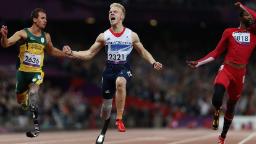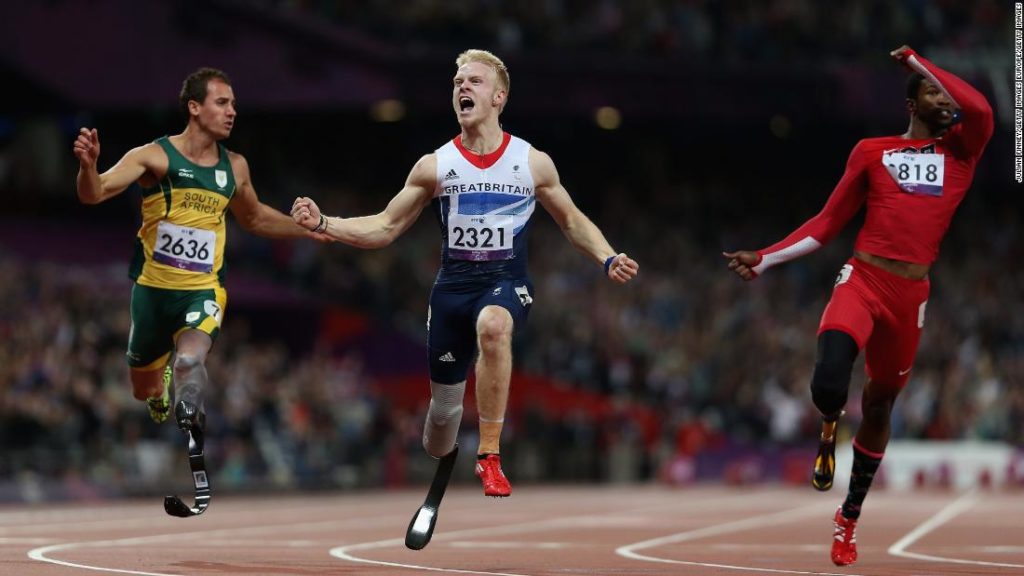
Such a legend sits close to the heart of the Netflix documentary, “Rising Phoenix,” which follows the story of nine Paralympians. Each featured athlete is on a very distinct journey to gold medal success with a story to tell and an unwavering appetite to win. It was released in August 2020.
The team approached Paralympic athletes, including double gold medalist sprinter Jonnie Peacock. The Briton contracted meningitis when he was five and had to have his right leg amputated as a result.
He has since excelled in the 100 meters, in the T44 category, a class which includes athletes with a lower knee amputation.
It’s a documentary that makes you want to cry, then laugh, then cry again.
French long jump champion and sprinter Jean-Baptiste Alaize explains how he survived an attack in Burundi during the civil war in 1994, when he was just three.
Alaize remembers it as if it was yesterday. He says he chose long jump as a way to “run away from something.”
Over the years, Peacock admits he has started “forgetting” about Paralympians’ back stories but the documentary brought that back.
“The story of Jean-Baptiste Alaize is the best example because his is the most brutal. It’s the most hard hitting, it’s the most transformative,” Peacock said.
‘Part of my body trying to kill me’
Another star of the documentary is Beatrice “Bebe” Vio, who inspired the documentary’s title. She was given the nickname “Rising Phoenix” as a teen. The Italian fell in love with fencing aged six and has never looked back since, winning medal after medal.
In 2012, she represented future Paralympians as a torchbearer in London and waited four more years before entering her first Paralympic Games in Rio where she won gold in the Women’s foil category B, a class which includes athletes that have an impairment that impacts either their torso or fencing arm.
Aged 11, she had a headache one day after training and came home with a bruise on the top of her head. Her mother asked whether she had been fencing without a mask. She hadn’t but rather contracted meningitis.
“A part of my body was trying to kill me. It was like a kind of match. I have to fence to win against my disease,” says Vio in the documentary.
She first had both her arms amputated, then both her legs when the disease returned.
“Sh*t happens,” she says, speaking in the documentary.
“I just started laughing and then crying and then screaming. And then I was like, ‘Oh my God.’ The documentary makes you feel completely different emotions altogether,” Vio told CNN Sport.
Both Peacock and Vio want the documentary to inspire the next generation.
“I just hope people break down those barriers. You can watch the Paralympics and you can change your attitude,” says Peacock. “You hope the people can come away from this and be inspired and question themselves. And question what they thought. ‘I thought I couldn’t do that.’ No, change your mind.”
Why the Paralympic Games?
The story of many Paralympians is very different to what could have been, according to Peacock. “One guy decided, ‘I want to make a difference,'” he said.
That man was Ludwig Guttmann. After the devastating reality of the two World Wars, the voice of people with a disability could no longer be ignored. Guttmann, a renowned Jewish neurosurgeon and neurologist from Germany, fled to England when Adolf Hitler gained power.
He was then hired by the British government to work with injured men from World War II and decided to fund the National Spine Injury Centre in Stoke Mandeville in 1943.
Guttmann went a step further five years later and created the Stoke Mandeville Games for paralyzed ex-servicemen, with only 16 participants.
In order to get the best publicity, he decided to launch the first edition of the Games in 1948, which coincided with the same opening day as the Summer Olympics in London.
“They trained all the time to get fitter, to get better, to be faster. The movement just took off,” says Eva Loeffler, Guttmann’s daughter, in the documentary.
It was in 1951 that he decided to hold the Stoke Mandeville Games every four years in the same city as the Olympic Games.
Year after year, the event has grown bigger and bigger to finally become what the massive event is known as today: the Paralympic Games.
Coverage of para sports has changed
“How did you lose your leg?” used to be the first question that journalists would ask Peacock.
Criticism has often been directed towards the media regarding the coverage of the Paralympic Games because of its quality — often being condescending and stereotypical — or simply by the amount of coverage compared to able-bodied sports.
But Peacock refers to the marketing campaign that British broadcaster Channel 4 launched in 2012, right after the Olympic Games finished, which changed the way para-athletes were portrayed.
“Suddenly, after 2012, people wanted to learn more about the Paralympics. People suddenly wanted to know, ‘How does he manage to coach himself like this? How did she jump like that out of nowhere?'” says Peacock. “I can’t see anything that made more of an impact than the media in 2012.”
He continues: “How have they chosen to present that? Have they chosen to present it as a sport? Or have they chosen to patronize you and show everybody, ‘Oh, isn’t this amazing? We’ve got a lovely couple of disabled people trying something out.’ That’s literally how it was.
“When the media changed it, my word, that Channel 4 advertising campaign was great. It was finally getting away from patronizing.”
‘We’re The Superhuman’ and ‘Thanks for the warm-up’ were examples of advertising during the lead up to the 2012 Paralympic Games. That very campaign was led by Nugent.
Hopes for Tokyo 2020
The Olympic and Paralympic Games, like sporting events around the world, were postponed due to the Covid-19 pandemic.
Peacock, who had knee surgery back in December 2019, is “probably one of the few athletes who’s pretty happy” to have an extra year to train. The sprinter says he’s hoping for a third gold medal.
“Nobody wants to lose, right? Once you’ve had that gold, there’s no way you want silver,” he said, adding that he’s aiming to smash his 2017 personal best — 10.64 seconds.
“Hopefully, it’ll be a nice, fast race and we’ll be able to put a show on, and hopefully I’ll be at the front of that.”
Italian fencer Vio, however, doesn’t want to jinx anything in case it’s “bad luck.” Besides individual glory, she is targeting the team competition.
“The team competition is not only me, it’s the entire city, it’s everyone’s neighbor, it’s my high school teacher, it’s everyone […] I just know I want to win the team competition,” said Vio.
Hunger for gold
The release of the documentary coincided with what should have been the original first week of the Tokyo 2020 Paralympic Games. But despite a Covid state of emergency in Tokyo and many other parts of Japan, the competition is set to take place from August 24th to September 5th.
Alexander McQueen’s documentary directors Ian Bonhôte and Peter Ettedgui use “Rising Phoenix” to follow the lives of Peacock, Vio, Alaize, Matt Stutzman, Ntando Mahlangu, Tatyana McFadden, Cui Zhe, Ryley Batt and Ellie Cole. All of them have the same hunger for gold at Tokyo 2020 — and to keep Guttmann’s legacy going.
You may also like
-
Super League: UEFA forced to drop disciplinary proceedings against remaining clubs
-
Simone Biles says she ‘should have quit way before Tokyo’
-
Kyrie Irving: NBA star the latest to withhold vaccination status
-
Roger Hunt: English football mourns death of Liverpool striker and World Cup winner
-
‘Every single time I lift the bar, I’m just lifting my country up’: Shiva Karout’s quest for powerlifting glory

